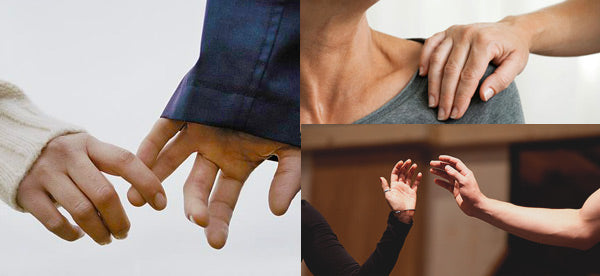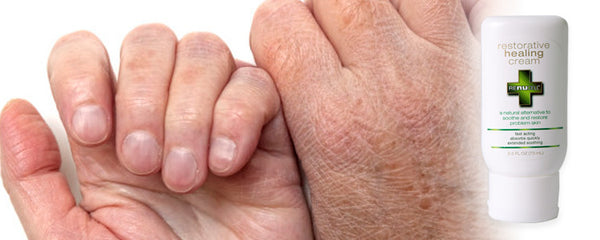The Science of Human Touch
Share
Office parties, meeting the in-laws for the first time, and holiday gatherings all involve plenty of new people. Your handshake, your confidence, your glowing skin all of these combine to create a first impression and a memory for people to remember you by.
But touch is much more important than that, according to science.
Humans can "talk" through touch
Scientists are discovering that when you touch someone, you communicate very specific emotions such as sympathy, disgust, gratitude, or even love.
Touch is a rich medium of social exchange and through it, individuals form strong attachments and cooperative alliances, they negotiate status differences, they soothe and calm, and they express sexual and romantic interest (Hertestein, 2006.)
Scientists tested how accurately people can communicate 12 emotions through touch. As a result they found that anger, fear, disgust, love, gratitude and sympathy were accurately communicated at far above chance levels, whereas some of the self-focused emotions, which were embarrassment, envy, pride were not accurately communicated through touch.
There are types of touch that can characterize specific emotions, anger was signaled by hitting or squeezing, fear by a lot of trembling, happiness by swinging, and disgust by pushing and lifting. Sympathy was most clearly communicated by patting, stroking, and rubbing. Love was signaled by the acts of gentle stroking and the interlocking of fingers. "So we did find distinct touch behaviors that characterize each of the emotions."

The Power of Touch
Receptors sensitive to pressure, warmth, and other triggers, cause our bodies to release a rush of oxytocin. Oxytocin has been studied in monogamous prairie voles, in nursing mothers, and in human couples where it is thought to be involved with the promotion of associative behaviors such as compassion, and which builds trust between individuals.

A more contemporary context for prosocial behaviors is in competitive sports. In a 2010 paper published in the journal Emotion, Dr. Keltner’s group correctly predicted better outcomes in the 2008-2009 season for those NBA teams whose athletes touched one another most frequently and in a positive manner (e.g. chest bumping, high-fives, hugs, huddles, etc) early in the season.
Extending these findings to humans, Dr. Tiffany Field (from the Touch Research Institute) and others compared the growth rates of premature infants who were maintained in incubators without touch (standard protocol) to those who were subjected to light massage several times a day. Shortly after birth, premature babies are placed in aseptic environments, where they are fed intravenously and often go for extended periods without touch. Despite being fed exactly the same amount, the premature babies who were lightly massaged several times a day gained 21-47% more weight than the premature infants who were not touched.
In addition to having a well-known calming effect on infants, a nurturing touch is critical for proper cognitive development. Studies have shown that babies who are held and touched in a positive way more often also demonstrate lifelong resilience to stress and improved cognition. Elderly patients in nursing homes, particularly widows, may also be missing the warm touch of a loved one. One study observed that “therapeutic touch” (described as a healing process facilitated by hands) decreased stress-associated cortisol levels, and the frequency of agitated behaviors in individuals suffering from Alzheimer’s Disease.
As Darwin astutely noticed, for social animals, behaviors that allow us to cement bonds with others should persist because altruism is an adaptive trait. Chemical messengers such as oxytocin help to reinforce specific adaptive behaviors such as positive touch.
Softer Skin for a Human Touch
As the seasons turn and more time is spent indoors with friends, family, and loved ones even more of our communication revolves around being close to people. Whether it’s placing your hand on someone’s shoulder, or partnering with them while dancing, touch is a timeless way to communicate and show we care.
You can make sure you come across as warm, and pleasant a number of ways, but our expertise is in skin care so we recommend maintaining smooth, moisturized skin and you’ll be on your way to creating that warm first impression. An easy way to bridge the gap between people and make your gestures the most caring, is to ensure your hands and skin are healthy so you don’t have to worry about them feeling rough or looking dry.
Touch is one of the easiest ways to connect and show affection. Our team at Renucell want to make sure you’re not worrying about anything related to your skin while you’re holding, hugging, or embracing someone close to you.

Learn More about the Science of Touch
- How To Make The Perfect First Impression (According To Science)
- Study: Humans Can 'Talk' Through Touch
- Touch communicates distinct emotions.
- Gender and the Communication of Emotion Via Touch
- Touch Research Institute
- The Power of Touch
- Oxytocin and mutual communication in mother-infant bonding
- The Science of Touch and Emotion
